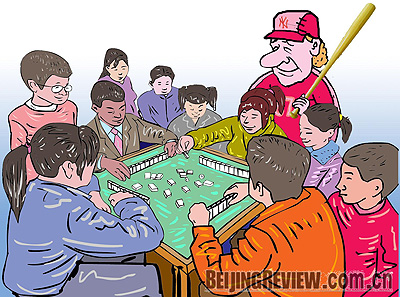|

My television screen flicked on, and the crowd's excitement with sports action seemed so familiar, yet momentarily strange. An announcer's voice described the game with infectious enthusiasm. The crowd of over 70,000 in the stands was going wild, and the players were moving with precision and speed. The pitching, the batting, runners racing around the bases, and acrobatic fielding. Yes, this was baseball, a game I have loved since my childhood, but how could I be watching game highlights being replayed on a Japanese station? It was Japan against Korea for the World Baseball Championship- pure drama. Venezuela had earlier disposed of the U.S. team, and still I could not stop watching. The game of baseball is deeply embedded in the West and today, it also is becoming popular in the East. However, the game of mahjong has even deeper cultural roots here.
In China, perhaps every other family has at least one relative who has a deep passion for the game, if not mother, father, or uncle, maybe grandpa or grandma. A 64- year-old woman won a citywide mahjong tournament in Hangzhou a few years ago. People who love and follow mahjong are still buzzing about this feat. In 2007, Li Li, a young Tsinghua University student won the first United World Mahjong Championships in Chengdu. Unforgettable events like these are relished just as much by Chinese sports enthusiasts, as by Americans when "Hammering" Hank Aaron eclipsed baseball's legendary Babe Ruth's lifetime home run record, or when the New York Yankees or Atlanta Braves won what is called Major League Baseball's "World Series." Of paramount importance, however, is the fact that both sports are deeply embedded in their distinct cultures, reflecting traditions that have been carried through many historical and social changes to survive generation after generation.
There may be crucial differences between these two popular board and field games, however, both have vital things in common. These sports symbolically represent "cash cows" for many involved, and can be time consuming.
Baseball and mahjong share the skill, strategy, and calculative aspects, along with the ultimate "error factor" which may increase the likelihood of a loss. Both games also have "fans" or avid followers, who in many instances may simply enjoy the roles of second-guessing spectators. This is the position where I fit in best, simply because I am not good enough to wager even simple match-sticks or marbles, and to the more skilled players, my playing speed needs the prodding of a very slow time-clock. Baseball's similarity to mahjong is reflected in the contest's time span, because games can seemingly go on forever. People criticize the game for its slowness, bordering on boredom. By the same token, this could also be said by anti-mahjong critics who assume that all mahjong is good for is squandering away time or illegal gambling.
Yes, it is true that illegal gambling or use of "performance enhancers" have been known to give baseball a black eye. However, on the brighter side, there are stolen bases and homeruns when clutch players help their teams score points, but in the game of mahjong, individual players help themselves win or avoid losses by making timely sentences, organizing symbols on small tiled blocks. A "big win" (or "homerun" using baseball terminology) would be when a mahjong player is able to lay all of his tiles down at once, catching the other players by surprise. This is called "going out." Players who have not revealed any tiled arrangement of symbols suffer the most penalties.
Marriages have tragically ended due to addiction to mahjong. It is also known that businesses have gone aground or belly-up due to over involvement in playing the game. Since violence is a rarity, you don't need to sit at the mahjong table wearing protective gear, as is a must in baseball. However, given the likelihood of a loser throwing a violent temper tantrum, maybe wearing mahjong protection gear might be a thing of the future. One story goes that players were so addicted to the competition that even after the table had been robbed, and one player shot, they all elected to continue play and seek medical "help" later.
The bottom line, however, is both mahjong and baseball are loved or hated by many with equal passion. While we don't yet see mahjong tournaments regularly on television, that day may rapidly be approaching. If you are on a street, in a park, or a guest in someone's home, accept an invitation to play just for fun if offered. It is a great way of making new acquaintances and enjoying pure drama too!
The writer is an American living in China |
